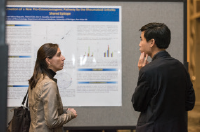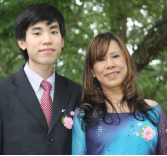
Dr. Le attended the ACR’s Rheumatology Research Workshop, which is held in conjunction with the Foundation’s Investigators’ Meeting. He used the opportunity to network with others in the field, such as Sarah Veloso Nogueira, PhD.
Brian Le, MD, a rheumatology fellow at the Medical College of Georgia at Augusta University (MCG), credits an excellent mentor and two Rheumatology Research Foundation preceptorships with guiding his career toward rheumatology.
“Working with Dr. Laura Carbone has opened up a lot of doors for me,” says Dr. Le. “I wouldn’t have such a great relationship with her if it weren’t for the Foundation preceptorships.”
Dr. Le was first introduced to the Foundation in 2014, when Laura Carbone, MD, MS, rheumatology division chief at MCG, urged him to apply for the Foundation’s Medical and Graduate Student Clinical Preceptorship, an award that supports a mentored, full-time clinical experience for students. Dr. Le received the award and spent one month working closely with Dr. Carbone and a handful of other faculty members and fellows to learn more about all the different aspects within the field. He was involved in adult rheumatology clinics, a pediatric rheumatology clinic, an osteoporosis clinic, a research project involving spinal cord injuries and a short course on biostatistics and epidemiology. He says the experience convinced him to choose rheumatology.
“I had the ability to pursue interests in research and writing, in addition to patient care. Truly, it is my passion to be able to make a difference in patients’ lives on a personal level, but also be able to create change or leave a legacy more globally.”

Dr. Le with his late mother, Hoa Le. He is carrying forth her legacy by pursuing a career in rheumatology to help patients.
Dr. Le’s career in rheumatology was then propelled again in 2015, when he received the Foundation’s Resident Research Preceptorship. This experience allowed him to do research with patients to study lupus and end-stage renal disease. “It gave me the opportunity to start my own project, ask a question, and go through the process. It has allowed me to develop a thinking method that is necessary to do research.”
Direction in a Difficult Time
The support for Dr. Le’s rheumatology career came at a much needed time. During his third year of medical school, Dr. Le’s mother was diagnosed with cancer. He says it was a difficult time caring for his family while trying to keep up with medical school. “I was ambivalent, overwhelmed and upset by the lack of direction in my career and my ambitions. I felt exhausted.”
